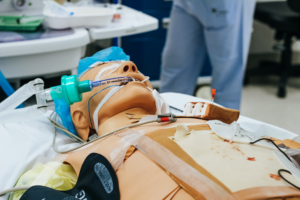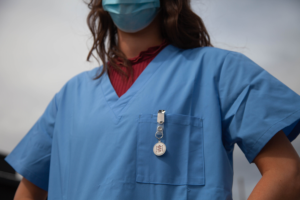
MSN Programs in Pennsylvania
By EveryNurse Staff on January 17, 2023

Motivated nurses who are looking for more opportunities and better salaries can realize a slew of benefits from continuing their education and earning a Master’s of Science Degree in Nursing. As the demand for qualified nurses grows throughout the country and in the state of Pennsylvania, the healthcare industry is on the lookout for nurses with advanced degrees to teach others, step into administrative roles and take on advanced nursing roles. The first step is seeking out one of the high-quality schools with MSN programs in Pennsylvania.
Schools With MSN Programs in Pennsylvania
- Those in the Reading area can take advantage of the Department of Nursing at Alvernia University. This is a great choice for those who require flexibility, because many courses are hybrid, meaning that most of the work can be done online. However, some of the material must be given in a classroom format, including laboratory experiences and any clinical practice hours. Only those who hold a BSN degree from an accredited college or university will be considered for the MSN program, and they must have an undergraduate Grade Point Average of 3.0 or higher.
- Bloomsburg University of Pennsylvania’s Department of Nursing offers up two different routes for students to get their MSN degree, including the traditional route for BSN holders and the RN to MSN bridge program. The school offers up a variety of specialties, including Adult Nurse Practitioner, Family Nurse Practitioner, Community Health, Gerontology Primary Care, Nursing Administration and Nurse Anesthesia. Full-time and part-time study is available, and applicants for the traditional MSN route must have a BSN degree from an accredited university as well as an undergraduate Grade Point Average of 3.0.
- Individuals in the Pittsburgh area can take advantage of the Carlow University School of Nursing, which offers up two different specialty areas, including Family Nurse Practitioner and Education and Leadership. Men and women who are interested in earning an MSN/MBA dual degree can do so here as well, and all courses provide a great foundation for future doctoral studies. Those who are focusing on the Family Nurse Practitioner specialty can enjoy hybrid courses, which combine online and classroom learning. Individuals must hold a BSN from an accredited program and have a valid RN license for the state of Pennsylvania.
- At Cedar Crest College, individuals can specialize in Nursing Education or Nursing Administration, and will find that the study times are very flexible. Programs can be completed in as little as two years, but men and women can take up to four years to complete them as well. Applicants must have a BSN degree from an accredited nursing program, and must have an unencumbered RN license.
- Chatham University Nursing Department offers up a variety of specializations for students to choose from, including Nursing Leadership, Nursing Education and Nursing Informatics. These 36 credit-hour programs include 21 core credits and 15 specialization credits and will include 250 clinical hours. Those who apply for the program must currently hold a Bachelor’s of Science Degree in Nursing from an accredited college or university, must have an undergraduate GPA of 3.0 and a valid RN license in the state of Pennsylvania.
- Those who are in or around Center Valley can take advantage of the Desales University Department of Nursing and Health. Here, students can take one of two routes to the MSN degree, the RN to MSN bridge program or the traditional program for BSN holders. Individuals can specialize as an Adult Gerontology Acute Care Clinical Nurse Specialist or Family Nurse Practitioner. Those looking for the MSN/MBA dual degree can find it here as well. Those who wish to be included in the RN to MSN bridge program must hold a diploma or Associate’s degree in nursing.
- Drexel University’s College of Nursing and Health Professions offers an MSN program that caters to BSN holders, RNs with a diploma or Associate’s degree and those with a Bachelor’s degree in another field. Those who want to participate in the RN to MSN bridge program must complete three undergraduate programs to qualify. This school offers several specializations, including but not limited to Adult-Gerontology Acute Care Nurse Practitioner, Family Nurse Practitioner, Pediatric Primary Care Nurse Practitioner, and Nursing Education and Faculty Role.
- At the Duquesne University School of Nursing, individuals can specialize in the Family Nurse Practitioner program, the Forensic Nursing program or Nursing Education. Individuals take online classes and participate in some campus visits for hands-on learning. To be considered for the program, individuals must hold a BSN degree from an accredited nursing program and must have an undergraduate GPA of at least 3.0.
- The Villa Maria School of Nursing from Gannon University lets individuals earn an MSN degree in a couple of different ways, including the traditional BSN to MSN route and the RN to MSN bridge program. Specializations offered include Nurse Anesthesia, Family Nurse Practitioner and Nursing Administration. Those who apply for the traditional route must have a BSN from an accredited program, and all applicants must have an unencumbered RN license in the state of Pennsylvania.
- Those who are in the Gwynedd Valley can take advantage of the Gwynedd-Mercy College School of Nursing and Health Professions. This school offers the RN to MSN bridge program as well as traditional route to the MSN for those who have a BSN from an accredited program. Specializations offered include Adult-Gerontology Clinical Nurse Specialist, Nurse Educator, Adult-Gerontology Nurse Practitioner and Pediatric Nurse Practitioner. All applicants must have a license as an RN in the state of Pennsylvania and GRE or MAT scores are required.
- At Holy Family University’s School of Nursing and Allied Health Professions, men and women can earn an MSN through the traditional program (for those holding a BSN degree) or through the RN to MSN bridge program. Here, individuals can choose from the Community Health Nursing, Nursing Administration or the Nursing Education specialization. All applicants to the RN to MSN bridge program must have a diploma or Associate’s degree in nursing from an accredited school and applicants to the traditional program need an undergraduate grade point average of at least 3.0.
- At Immaculata University’s Division of Nursing, there are two specializations for the MSN program: Nursing Administration and Nursing Education. Registered nurses who have earned a nursing diploma or an Associate’s degree in nursing can participate through the RN to MSN bridge program. Individuals who apply for the traditional program must have a BSN from an accredited nursing program and an undergraduate GPA of at least 3.0.
- With the Department of Nursing and Allied Health Professions at Indiana University of Pennsylvania, individuals can earn an MSN with specializations in Nursing Education and Nursing Administration; both 36 credit hour programs. Applicants are required to have a BSN degree from an accredited nursing program and an undergraduate GPA of 3.0 or higher as well as an unencumbered RN license in the state of Pennsylvania.
- With La Roche College, individuals can earn their MSN with specializations in Nursing Administration and Nursing Education. Both of these can be taken in the online format, which is predominantly online, but students will need to show up for certain campus learning activities. Applicants must have a BSN from an accredited program and an undergraduate GPA of 3.0 or higher.
- Those who are in or around the Philadelphia area can take advantage of the La Salle University’s School of Nursing and Health Sciences. The MSN program is available for registered nurses who have earned a diploma or Associate’s degree or those who have a BSN degree from an accredited program. There are a variety of specializations offered, from Adult Health and Illness Clinical Nurse Specialist to Nursing Administration. Those who are looking for the MSN/MBA dual degree can find it here as well. All applicants must have an unencumbered RN license in the state of Pennsylvania.
- The Department of Nursing at Millersville University offers up the Family Nurse Practitioner and Nurse Educator specializations, which are 43 credit hour and 35 credit hour programs respectively. In order to be considered for the programs, individuals must have a BSN degree from an accredited program and an undergraduate GPA of at least 3.0. The school asks that their applicants also have at least a year of clinical experience as a registered nurse.
- At Misericordia University’s Department of Nursing, individuals can earn their MSN in two different ways: the traditional route for those who hold a BSN degree from an accredited university or the RN to MSN bridge program for RNs with a diploma or Associate’s degree in nursing. The specialization at this school is Family Nurse Practitioner. Traditional applicants must have an undergraduate GPA of 3.0 or higher and all applicants must hold a current, valid RN license in the state of Pennsylvania.
- At St. Luke’s Hospital School of Nursing at Moravian College, there are three different specializations for the MSN program: Clinical Nurse Leader, Nurse Administrator and Nurse Educator. The program caters to individuals who have already earned their BSN from an accredited nursing program as well as registered nurses who have a diploma or Associate’s degree and individuals who have earned a Bachelor’s degree in another field. All applicants must have an undergraduate Grade Point Average of 3.0 or higher, and must provide placement scores such as GRE or MAT scores.
- Men and women in or around the Aston area can take advantage of the Neumann College Department of Nursing, which boasts an excellent MSN program with a concentration in Adult-Gerontology Primary Care Nurse Practitioner. All applicants must have a BSN degree from a regionally and nationally accredited nursing program and undergraduate GPA of 3.0 or higher. Those with a lower GPA will be considered on a case by case basis but all applicants must have at least a year’s clinical experience as a registered nurse.
- With the School of Nursing and Health Sciences at Robert Morris University, individuals can earn their MSN specializing in Nursing Education. For registered nurses with a diploma or Associate’s degree, the RN to MSN program prepares them for an MSN and the program is offered completely online, designed to be completed in 3 years. All individuals who are applying for the traditional program must have a BSN from an accredited nursing program as well as an undergraduate GPA of at least 3.25.
- At the Pennsylvania State University School of Nursing, individuals can earn their MSN with several different specializations, including Family Nurse Practitioner, Adult-Gerontology Primary Care Nurse Practitioner, Adult-Gerontology Acute Care Nurse Practitioner, Nurse Educator and Nurse Administrator. Applicants must have a BSN degree from a nationally or regionally accredited nursing program, and must have an undergraduate education of 3.3 or higher. All applicants must also have a current, valid RN license in the state of Pennsylvania.
- Those in the Philadelphia area can take advantage of the Thomas Jefferson University Jefferson School of Nursing, where there are several different routes for earning the MSN. With the traditional route, those with a BSN from an accredited nursing program can earn their MSN. The RN to MSN bridge program allows RNs with an associate’s degree or diploma to earn their MSN and the direct entry program is perfect for individuals who hold a Bachelor’s degree in another field. There is a huge number of specializations to choose from, as well as a dual MSN/MPH degree.
- Another school that offers a huge number of specializations is the University of Pennsylvania School of Nursing. Students earn their MSN degree through a couple of different routes: the traditional method for those who have a BSN degree from an accredited program, the RN to MSN bridge program for individuals who have an associate’s degree or diploma in nursing and the direct entry pathway for individuals who have a bachelor’s degree in another field. Most of their specializations can be earned on a full-time or part-time basis. Students must have an undergraduate GPA of 3.2 in order to be accepted, as well as a valid Registered Nurse license.
- With the University of Pittsburgh’s School of Nursing, men and women can earn their MSN and choose from specializations like Neonatal Nurse Practitioner, Nurse Anesthesia, Nursing Administration, Clinical Nurse Leader and Nursing Informatics. There are a few different routes as well, including the traditional method for BSN holders, the RN to MSN bridge program and the Direct Entry route for those who have a Bachelor’s Degree in another field. Applicants must have an undergraduate GPA of at least 3.0 and must have a current, valid RN license.
- The University of Scranton Department of Nursing offers three specializations for their MSN program, including Family Nurse Practitioner, Nurse Anesthesia and Adult Health Nursing. These programs are available to those who have a BSN degree from an accredited nursing program and RNs who have a diploma or an Associate’s degree in nursing. Those who are applying for the traditional program must have a BSN degree as well as an RN license, and a year of clinical experience.
- In the Villanova area, the Villanova University College of Nursing provides several specializations for their MSN degree, including Primary Care Adult Nurse Practitioner, Primary Care Pediatric Nurse Practitioner, Nurse Anesthesia, Nurse Educator and Health Care Administration. The program offers a few different routes, including the traditional route and the RN to MSN route. Applicants must have an undergraduate GPA of at least 3.0 and should have at least a year’s worth of clinical practice experience as an RN.
- With the Waynesburg University Department of Nursing, individuals can earn their MSN and specialize in a few different areas, including Nursing Informatics, Nursing Administration, and Nursing Education. Applicants must have a BSN from an accredited program, as well as an undergraduate grade point average of at least 3.0.
- At the West Chester University of Pennsylvania Department of Nursing, students are prepared to take on advanced roles like Clinical Nurse Specialists in Public Health Nursing. This program is a 39-credit hour program and applicants should hold a BSN from an accredited nursing program. They also ask that applicants have an undergraduate degree of at least 2.8 and have a current RN license in the state of Pennsylvania. Two years of clinical experience is required as well.
- Those in or around Chester can take advantage of the Widener University School of Nursing.It offers the traditional route for those who have earned a Bachelor’s of Science Degree in Nursing from an accredited university and the bridge program for registered nurses with an Associate’s degree or diploma. Specializations offered here include Adult-Gerontology Clinical Nurse Specialist, Adult-Gerontology Emergency/Critical Care Nurse Specialist and Family Nurse Practitioner. Part-time and full-time study is available and students will earn 500 hours of clinical practice.
- At the Wilkes University School of Nursing, students can choose from several different specializations, including but not limited to Adult-Gerontology Primary Care Nurse Practitioner, Nurse Executive and Nursing Education. There is the traditional route as well as the RN to BSN bridge program to choose from. Applicants should have an undergraduate GPA of at least 3.0 and should have a current RN license in the state of Pennsylvania.
- The York College of Pennsylvania offers a traditional route for the MSN degree as well as an RN to MSN bridge program. Those applying for the traditional route should have a BSN degree from an accredited college or university and individuals applying for the bridge program should have an Associate’s degree or diploma in nursing. Specializations include Adult-Gerontology Nurse Practitioner, Adult-Gerontology Clinical Nurse Specialist, Nurse Anesthesia and Nurse Educator.
Level Up Your Career
Pennsylvania MSN Checklist
- Earn your RN license in the state of Pennsylvania.
- Enroll in one of the accredited MSN degree programs and choose your specialty, if desired.
- Meet all state-mandated supervised clinical hours experience during the length of the MSN program.
- Apply for licensure with the Pennsylvania State Board of Nursing and pay any appropriate fees.
- Pass the national certification examination for your chosen specialty.
Pennsylvania MSN Salary & Job Outlook
The Bureau of Labor Statistics gathers data for MSN-related careers, including salary information. Individuals with advanced-degrees in nursing tend to earn significantly more money than their counterparts without advanced degrees. For instance, the annual median salary of Medical and Health Service Managers was $92,870 as of May 2013. Other MSN-related career salaries are reported as follows: Nursing Instructors and Teachers ($77,020), Nurse Practitioners ($85,150), Nurse Midwives ($79,730).







